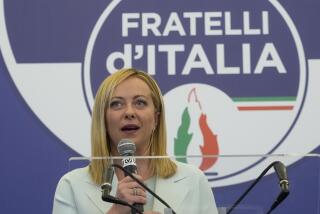What’s in a Name? For This Mussolini, It’s Everything
- Share via
ROME — If your last name is Mussolini, do you really want to inflict it on your children? Yes, says Alessandra Mussolini, granddaughter of the fascist dictator who was executed by Italian partisans at the end of World War II.
The problem, however, is that women in Italy cannot hand down their last names to their children -- not, at least, without an enormous battle.
Mussolini wants to remove political and legal hurdles and make it as easy for mothers as it is for fathers to bestow their surnames on their offspring.
“We are the ones who go through labor,” she said. “Why can’t we give our names?”
Her grandfather Benito Mussolini, “Il Duce,” was known for colonial conquests and anti-Semitic laws. She is a lawmaker for an offshoot of the political party considered heir to Italian fascism.
She said she had to fight for a year, wrestling with red tape from the local to the national level, to make her three children Mussolinis, not because of any opprobrium attached to the name but because she is a woman. Her husband supported the decision, she said, and so the kids use compound last names.
Under the Italian Constitution, a newborn gets his or her mother’s surname only if the father is unknown. Normally, the child automatically is given the father’s name; to do otherwise requires a series of judicial hearings, permission from city hall and two ministerial decrees. By contrast, in Germany, the parents are asked whose name the child takes; in Spain, the child is given both parents’ names.
Mussolini is backed by the government’s minister for equal opportunities and other lawmakers, and their cause got a boost last month when the Italian Supreme Court ruled that the name regulations were antiquated and discriminatory.
The court, which does not have the power to change the Constitution, was ruling on a lawsuit brought by a Milanese husband and wife after two lower courts upheld their city hall’s refusal to allow the maternal surname. It remains unclear whether City Hall registrars will relent for the couple, but advocates said the ruling gave them an important political weapon.
One of the lower courts said that permitting maternal surnames “could have a damaging impact on children, who might be regarded as illegitimate.” Resistance to the change reflects the dominant position men and fathers have in Italian society, a tradition that is only slowly changing, experts say.
Like much of the Mediterranean region, Italy lags behind northern Europe in incorporating women into the workplace and in social policies that support working mothers. Although the dynamic is changing for younger Italians, a man is generally seen as the breadwinner, secure in a job he will have for life, like his father before him (often it’s the same job).
European Union statistics bear this out, says sociologist Yuri Kazepov of Italy’s University of Urbino. For example, 72% of working-age women in Denmark were employed in 2000, compared with 41% in Italy.
At the same time, the traditional family unit remains stronger in Italy than in other parts of Europe. Denmark has an out-of-wedlock birthrate of about 50%, whereas the figure is less than 10% in Italy. In Britain, 20% of families are single-mother households; in Italy, 4% are.
“The family in Italy has the role of protecting its members, which impedes the family from breaking down ... but also slows change,” Kazepov said.
Evolving attitudes and pressure for Italy to conform to EU standards will force the relaxation of the most conservative rules, Mussolini and others say.
“Italy is becoming increasingly European and therefore attentive to the rights and beliefs of all its citizens,” Stefania Prestigiacomo, the equal opportunities minister, told the Italian news agency ANSA after the high court’s ruling.
Mussolini sees nothing wrong with her family name, and is quite proud of it. She once told supporters that she would name her son Benito.
She changed her mind in the end, naming the boy Romano, after her father.
More to Read
Sign up for Essential California
The most important California stories and recommendations in your inbox every morning.
You may occasionally receive promotional content from the Los Angeles Times.










